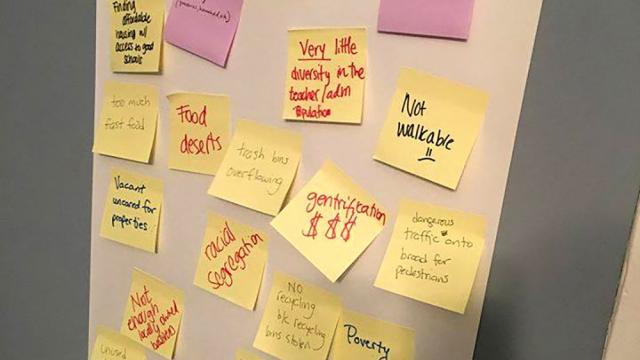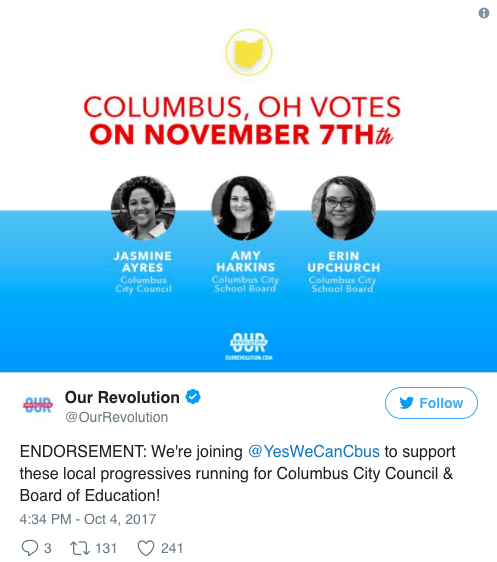
Voters in Columbus — Ohio’s largest city — will head to the polls this November to choose between a group of Democratic Party-endorsed incumbents for city council and the school board and a slate of progressive challengers backed by the Working Families Party. The challengers, running under the banner of “Yes We Can,” were inspired by the Bernie Sanders campaign and seek to unsettle a narrative that claims “Columbus Is Already Great.”
By many measures, Columbus is doing pretty well. It’s the fastest-growing city in the Midwest, it recently won a $50 million competitive grant from the U.S Department of Transportation to revamp its transportation systems, and it’s one of the few cities in the nation to boast a AAA bond rating, a signal of its strong financial position. Its Democratic mayor, Andrew Ginther, has taken to calling Columbus “America’s Opportunity City,” an epithet reiterated recently by national publications.
“Columbus is a great place to live, we are a very diverse city, and we have maintained a strong economic base,” Mike Sexton, chair of the Franklin County Democratic Party, said to The Intercept. “I think people are pretty happy with the direction that Columbus is going in.”
Will Petrik, a Yes We Can candidate running for city council, doesn’t think so. “We’re here to say no, we actually have mass income inequality, one of the highest infant mortality rates in the country, and a drug crisis that’s tearing apart families and communities,” he said. “Saying everything is awesome doesn’t reflect the experience of all Columbus residents, [and] we need to be honest in order to develop real solutions to improve people’s lives.”
Despite the city’s booming aura, it’s true that sharp disparities exist in Columbus. The Brookings Institution released a report this year that found that 42 percent of jobs created in the Columbus region between 2010 and 2015 were low wage. Richard Florida, an urban policy professor at the University of Toronto, found that among all U.S. metropolitan areas with over 1 million people, Columbus ranks second in terms of economic segregation.
The races in Columbus are emblematic of a question the Democratic Party is grappling with nationwide: Does the future belong to the populist left à la Vermont socialist Bernie Sanders, or will more moderate Democrats continue to dominate the party? Progressive candidates have been finding success in municipal elections. For instance, Christine Pellegrino, who was a Sanders delegate at the 2016 Democratic National Convention, was elected to the New York State Assembly this year, and Edie DesMarais became the first Democrat to win a state House seat in Wolfeboro, New Hampshire. Just this week, populist Randall Woodfin, supported by the Sanders-backed campaign group Our Revolution, was elected mayor of Birmingham, Alabama.
Yes We Can, which held its first meeting in Petrik’s living room in January 2016, felt that the Democratic Party too often overlooked quality candidates in favor of operatives who had sufficiently demonstrated their loyalty and “paid their dues.” Inspired by the recruitment process of Brand New Congress, a PAC formed by former staffers and supporters of the Sanders presidential campaign, Yes We Can sought to urge new kinds of people to throw their hat into the political ring. For example, Jasmine Ayres, a first-time candidate and community organizer, is running for city council with Yes We Can, and Erin Upchurch, a social worker and first-time candidate, is pursuing a spot on the school board.
“[We] know we need to change the game, not just play it,” reads one Yes We Can flyer. “That’s why we’re the only group in Columbus focused on electing new, progressive leaders who speak up about income inequality, tax giveaways to wealthy developers, violence in our communities, and the challenges facing our schools.”
The national progressive movement has taken notice: On Tuesday, Our Revolution endorsed the three Yes We Can candidates who performed best in the primary elections: Ayres for city council and Upchurch and Amy Harkins for school board.
The Democratic Party in Franklin County isn’t so thrilled about these new challengers in the nonpartisan elections.
Jen House, who chaired Franklin County’s most recent Democratic endorsement process, was quoted in the Columbus Dispatch in May as saying that Yes We Can was trying to undermine the work of the local Democratic Party. When The Intercept asked for further clarification, House expressed frustration at those “who call themselves Democrats standing out there and refusing to acknowledge” the good things that Democrats are doing. And “being constantly negative,” she added, fuels a feeling in Columbus and throughout the state that government can’t do anything right. “It’s really easy to stand on the sideline and throw rocks, but it’s a whole different ballgame when you’re forced to govern,” she said.
House also pushed back against the idea that Columbus has long been a safe bet for the party. “Things have been run by Democrats for a very long time in other cities, but in Columbus, it’s all still relatively new,” she told The Intercept, adding that some countywide offices are still held by Republicans, including the county prosecutor who was re-elected last year.
The Franklin County Democratic Party endorsed the establishment candidates for city council and the school board months before the primary elections, drawing criticism that it rubber-stamped the incumbents. House defended the party’s actions, emphasizing that all candidates received equal time to make their case before the screening committee. In the end, she said, her committee felt the incumbents had more experience, had done good work, and deserved their support. “What’s getting lost is that people just assume that we did not put a lot of thought into this,” House said. “We do not just automatically support incumbents, but we endorse candidates we think are worthy.”
Columbus Democrats also question Yes We Can’s affiliation with the Working Families Party, a national political organization that helps elect progressive candidates for office. The group endorsed Yes We Can in March, its first official endorsement in Ohio, where only the Democratic, Republican, and Green parties are recognized. Under state law, candidates’ party affiliation is determined by how they voted in the last partisan primary. All five Yes We Can candidates voted during the last Democratic primary, meaning they are considered Democrats.
“It seems a little disingenuous to call themselves a party when [WFP] is not recognized in Ohio,” said House. “And then they also get to call themselves Democrats. It’s not really fair to voters.”
Joe Dinkin, WFP’s national communications director, said that for his organization, a party is defined as a group of people who share a set of values and work together to make change through the electoral process. “That can take a lot of forms,” he told The Intercept, “including backing a challenger in a Democratic primary, helping a progressive Democrat beat a Tea Party Republican, or fielding candidates in nonpartisan races, or putting an initiative on the ballot.” In other words, the group’s definition of a political party extends beyond the formal party structure.
WFP is recognized as an official political party in New York, Connecticut, and Oregon, three states that allow for cross-endorsements, meaning a candidate can accept more than one party’s nomination. The strategy has helped the group get candidates elected, most notably in the 2013 election of Bill de Blasio as New York City’s mayor. But in Ohio, where cross-endorsements are not permitted, WFP has no strategic incentive to seek formal party status.
As Yes We Can candidates seek to distinguish themselves from the local Democratic establishment, they have begun to highlight the issue of police violence. “None of our elected officials — especially those running in this election — are speaking up about police brutality,” said Upchurch. “There’s absolute silence, and it speaks volumes.”
The city has witnessed a number of incidents of unchecked police violence in the recent past, and locals are dissatisfied with the official response. In June 2016, two Columbus plainclothes police officers shot and killed Henry Green, a 23-year-old black man. Three months later, a Columbus police officer fatally shot Tyre King, a 13-year-old black boy who pulled a BB gun from his waistband. None of the three cops involved in Green and King’s deaths were criminally charged, and following King’s death, the city’s mayor stressed that Columbus is still “the safest big city in America.”
Then last month, more than 100 protesters took over a Columbus City Council meeting to call for the firing of police officers recently caught on camera beating a man and threatening to “choke the life out of [him].” Following the meeting, the city council president reiterated that he had confidence in the police department and the police chief.
Yes We Can also sees an opportunity to change the narrative around Columbus public education, in part by scrutinizing the school board through a social justice lens. One issue the candidates have focused on is the number of tax abatements the city has been awarding developers, largely at the expense of school funding.
In September, the Columbus Education Association, the city’s local teachers union, voted “no confidence” in the seven-person Democratic school board. After a period of intense negotiations, the union ratified a new contract that many members felt was disrespectful. “It was the board’s final offer, we were not satisfied,” said Tracey Johnson, the union’s president. Johnson would not tell The Intercept whether the Columbus Education Association would be endorsing the school board incumbents or the Yes We Can candidates, though she said her union would make its announcement soon.
Regardless of which Democratic Party wing succeeds in the Columbus elections, the Republicans, who have supermajorities in both chambers of the state legislature, have worked to sharply limit what blue cities like Columbus, Cleveland, and Cincinnati can accomplish on their own. In a lame-duck session at the end of 2016, the Ohio legislature rushed through a measure that prohibits Ohio cities from raising their local minimum wage, joining 22 other states that passed similar “preemption” laws.
“I will say, there are people in Yes We Can who think the Columbus City Council should just take up the challenge — raise the minimum wage — and go fight the state in court,” said House. “However, our city prosecutor has said he doesn’t think it would be successful, in part because there is only one Democrat on the Ohio Supreme Court.” House thinks the move would result in a large, unsuccessful legal expense for local taxpayers, and that perhaps the best route to raising the minimum raise in Columbus is working to elect Democratic state House candidates in rural Ohio.
Upchurch told the Intercept that at the very least, she sees more room for local progressive governments to make noise. “We can raise awareness, I know for a fact that most of our residents don’t even know what’s happening at the state-level around the minimum wage,” the school board candidate said. “Progressive leaders can start these conversations, and then advocate fiercely around them.”
Petrik concedes that Yes We Can’s odds of uprooting the Democratic establishment are a long shot, but winning this year is not necessarily the goal. “Bernie didn’t win, but he shifted the conversation and inspired a movement,” Petrik told The Intercept. “There is a new base of people who’ve become politically engaged, and they understand how broken the system is. We know change takes time, so it might not be this year, and may not be in three years, but we believe that we will win.”
3 WAYS TO SHOW YOUR SUPPORT
- Log in to post comments














